Related Research Articles

The Moody Blues were an English rock band formed in Birmingham in 1964. The band initially consisted of Graeme Edge (drums), Denny Laine (guitar/vocals), Mike Pinder (keyboards/vocals), Ray Thomas (multi-instrumentalist/vocals), and Clint Warwick (bass/vocals). Originally part of the British beat and R&B scene of the early–mid 1960s, the band came to prominence with the UK No. 1 and US Top 10 single "Go Now" in late 1964/early 1965. Laine and Warwick both left the band in 1966, with Edge, Pinder and Thomas recruiting new members Justin Hayward (guitar/vocals) and John Lodge (bass/vocals). They embraced the psychedelic rock movement of the late 1960s, with their second album, 1967's Days of Future Passed, being a fusion of rock with classical music that established the band as pioneers in the development of art rock and progressive rock. It has been described as a "landmark" and "one of the first successful concept albums".
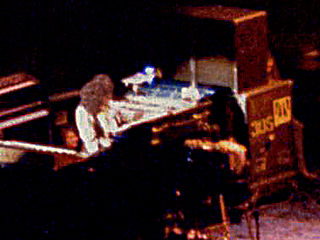
Patrick Philippe Moraz is a Swiss musician, film composer and songwriter, best known for his tenures as keyboardist in the rock bands Yes and the Moody Blues.
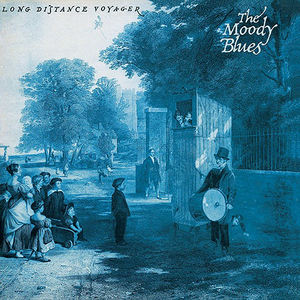
Long Distance Voyager is the tenth album by the Moody Blues, first released in May 1981 on the group's Threshold record label. It was the group's first album featuring keyboardist Patrick Moraz in place of co-founder Mike Pinder, who left after Octave in 1978.

Raymond Thomas was an English musician, singer and songwriter. He was best known as a founding member of the English progressive rock band the Moody Blues. His flute solo on the band's 1967 hit single "Nights in White Satin" is regarded as one of progressive rock's defining moments. In 2018, he was posthumously inducted into the Rock and Roll Hall of Fame as a member of the Moody Blues.

The Other Side of Life is the twelfth studio album by English progressive rock band the Moody Blues, released in April 1986 by Polydor Records.

Graeme Charles Edge was an English musician, songwriter and poet, best known as the co-founder and drummer of the English band the Moody Blues. In addition to his work with the Moody Blues, Edge worked as the bandleader of his own outfit, the Graeme Edge Band. He contributed his talents to a variety of other projects throughout his career. In 2018, Edge was inducted into the Rock and Roll Hall of Fame as a member of the Moody Blues.
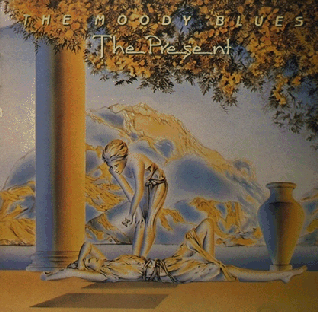
The Present is the eleventh album by the Moody Blues, released in 1983. This was the group's last original studio album to be released on their custom label, Threshold Records.
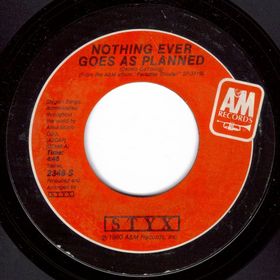
"Nothing Ever Goes as Planned" is a song written by Dennis DeYoung and released by American rock band Styx on their tenth album Paradise Theatre, as well as being the 3rd single released from the album. A chart disappointment following the first two singles off the album, it peaked at No. 54 on the U.S. pop chart in late summer 1981. It also reached No. 33 on the Canada RPM Top Singles chart in the week of September 5, 1981.
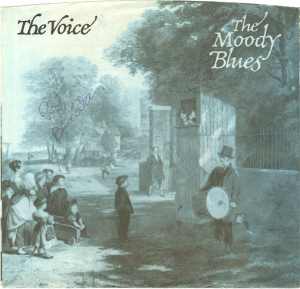
"The Voice" is a song written by Justin Hayward that was first released on the Moody Blues' 1981 album Long Distance Voyager and also as its second single. The song continued the success of previous single "Gemini Dream", becoming a Top 40 hit on the Billboard Hot 100, where it peaked at No. 15 in October 1981. The song had previously topped the Billboard Top Rock Tracks chart for four weeks during June–July 1981. The song also reached No. 9 in Canada.
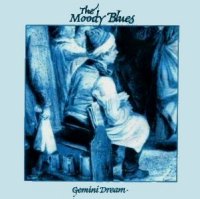
"Gemini Dream" is a song written by Justin Hayward and John Lodge that was released by The Moody Blues on their 1981 album Long Distance Voyager and also as the lead single from the album. It reached number 12 on the US Hot 100, as well as number 1 on the Canada RPM Top 100 Singles chart. It ranked as the 28th biggest Canadian hit of 1981.
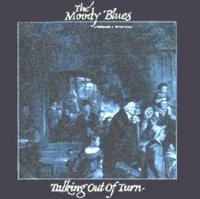
"Talking Out of Turn" is a 1981 single written by John Lodge and first released by the Moody Blues on their 1981 album Long Distance Voyager. It was also released as the third single from the album in November 1981 with "Veteran Cosmic Rocker" on the B-side.

"The Other Side of Life" is a 1986 single written by Justin Hayward and first released by The Moody Blues in May 1986 as the title track on the album The Other Side of Life. It was released as a single in August 1986, the second single released from the album, the first being "Your Wildest Dreams". After its release, it became a modest success in the United States, making #11 and #18 on the adult contemporary and mainstream rock charts respectively. It also reached #58 on the Billboard Hot 100 chart.

"Blue World" is a 1983 single by the Moody Blues written by Justin Hayward. It was first released in the UK as the lead single of the album The Present in August 1983. It was released as single in the US in the Fall of 1983. "Blue World" was one of three singles from The Present, with the others being "Sitting at the Wheel" and "Running Water." The single's cover is a pastiche of the painting Daybreak by Maxfield Parrish.

"Sitting at the Wheel" is a 1983 hit single by The Moody Blues, written by John Lodge. It was released in the US as the lead-off single from The Present in August 1983 and debuted on the Billboard Hot 100 on September 3, 1983. In the UK, "Sitting at the Wheel" was released in November 1983 as the second single from The Present, following "Blue World".

"No More Lies" is the second single released from the Moody Blues 1988 album Sur la Mer. As a single, it charted at #15 on the Adult Contemporary chart in 1988. Like the album's previous single, "I Know You're Out There Somewhere," "No More Lies" was written by Justin Hayward.

Voices in the Sky: The Best of The Moody Blues is a greatest hits compilation for The Moody Blues, released in 1984.
"Meanwhile" is a song written by Justin Hayward that was released on the Moody Blues 1981 album Long Distance Voyager. Although never released as a single, it reached #11 on the Billboard Mainstream Rock chart.

"22,000 Days" is a song written by Graeme Edge that was first released by the Moody Blues on their 1981 album Long Distance Voyager. It was also released as the B-side to the top-ten single "The Voice". "22,000 Days" reached No. 38 on the Billboard Top Rock Tracks chart.

"Running Water" is a song written by Justin Hayward that was first released on the Moody Blues' 1983 album The Present. It was released as the third single from the album in the United States but did not chart.
References
- 1 2 3 Cushman, Marc (2021). Long Distance Voyagers: The Story of the Moody Blues Volume 2 (1980-2018). Jacobs Brown Press. pp. 21, 33. ISBN 9781735567358.
- 1 2 Graff, Gary (5 June 1981). "Records: Moodies score with new sound". Pittsburgh Post-Gazette. p. 24. Retrieved 2024-02-12– via newspapers.com.
- 1 2 3 4 Freakes, Geoffrey (2019). The Moody Blues: Every Album, Every Song. Sonicbond. p. 92. ISBN 9781789520422.
- 1 2 3 4 Wincentsen, Edward (2001). The Moody Blues Companion. Wynn. pp. 121–122. ISBN 0964280892.
- ↑ Teverbaugh, Kim (2 August 1981). "The Moody Blues Return to Prominence with Latest Album". The Muncie Star. p. B-10. Retrieved 2024-02-12– via newspapers.com.
- ↑ Goller, Elaine Cloud (27 June 1981). "The Moody Blues are back..." Johnson City Press. p. 3. Retrieved 2024-02-12– via newspapers.com.
- ↑ McNulty, Henry (7 June 1981). "Elton: Echoes and Usherings". Hartford Courant. p. G7. Retrieved 2024-02-12– via newspapers.com.
- 1 2 Cromer, Ben (26 June 1981). "Moodies' layoff pays off with good set". Roanoke Times. p. C3. Retrieved 2024-02-12– via newspapers.com.
- ↑ Schlueter, Roger (18 June 1981). "'Cosmos' earns five-galaxy rating". Belleville News-Democrat. p. 7C. Retrieved 2024-02-14– via newspapers.com.
- ↑ Lawson, Michael (5 June 1981). "Moody Blues has some praise, some criticism". Alberni Valley Times. p. 7. Retrieved 2024-02-12– via newspapers.com.